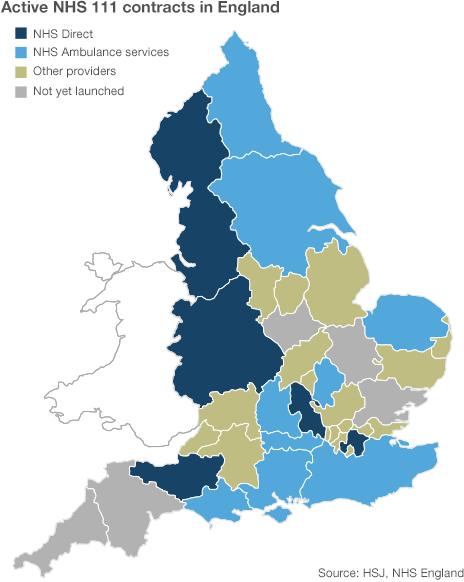NHS Direct wants to end 111 phone service contracts
- Published
Dr Chand Nagpaul: "Patients are not receiving the right advice when they call 111"
A major provider of the NHS non-emergency telephone service in England is seeking to pull out of its contracts due to financial problems.
NHS Direct initially won 11 of the 46 regional contracts for the service, covering 34% of the population.
It has already pulled out of two services, but now says the remaining nine are "financially unsustainable".
The whole 111 service has been plagued with problems. NHS bosses have said there is no room for complacency.
The service is run by different organisations in each area, including private companies, ambulance trusts and NHS Direct - which ran the old telephone advice line.
Discussions are already taking place with other providers, particularly the ambulance trusts, to see who could take over from NHS Direct.
'Unsustainable'
NHS Direct announced in June that it was pulling out of two areas - Cornwall and North Essex - even before the services were launched.
And earlier this month, it warned that the volume of calls at two of its larger contracts, North West and West Midlands, were 30-40% lower than contracted leading to lower income and leaving its whole 111 service "financially unsustainable".
NHS Direct used to be paid more than £20 per call when it ran the old 0845 number. The payment is between £7 and £9 per call for the new 111 service.
Projections, external reported earlier this month showed NHS Direct had lost £2.8m since April and was "heading for a deficit of £26m if we continue to run the same volume of 111 services until the end of this financial year".
The organisation is now seeking a "managed transfer" of its 111 contracts, which have between two and five years left to run, to another provider.
Nick Chapman, the chief executive of NHS Direct, said: "We will continue to provide a safe and reliable NHS 111 service to our patients until alternative arrangements can be made by commissioners.
"Whatever the outcome of the discussions on the future, patients will remain the central focus of our efforts, together with protecting our staff who work on NHS 111 to ensure that the service will continue to benefit from their skills and experience."
The health minister Lord Howe accused NHS Direct of "losing control of the ball" and said the majority of the country was getting a good service.
"Their problem, I'm afraid, is that they got their sums wrong, which is very disappointing," he added.
Bumpy start
The whole 111 service was meant to be up and running in April.
However, many areas were not ready and only half of services were operational by May. Some parts of England will not have an operational 111 service until 2014.

*NHS 111 regions are mergers of former PCT areas
There have also been problems with reports of callers not being able to get through and calls being inappropriately referred, leading to an extra strain on ambulances and hospitals.
Dame Barbara Hakin, deputy chief executive, NHS England: "We've been in discussion with other providers to take over this service"
Dame Barbara Hakin, the deputy chief executive of NHS England, told the BBC: "We've been in discussions with other providers, particularly the ambulance trusts who, with their experience, will be able to, in a properly managed fashion, take over this service from NHS Direct.
"I'm not going to pretend for one minute that we haven't had very significant problems with 111, which we need to deal with, but it's a really great service with potential."
'Failure'
Meanwhile, a Channel 4 undercover investigation at another 111 provider, Harmoni, has reported staff shortages, long waits for callers and some cases of ambulances being called out unnecessarily.
The Dispatches programme, which will air on Monday night, reports one call centre manager saying the service was "unsafe" at weekends because there were too few staff to deal with the calls coming in.
A spokesperson for the Prime Minister said the government was not shying away from problems with 111 and it was "confident that it will continue to push up standards for patients across the country".
Shadow health secretary, Andy Burnham, said it was a "mess of the government's making" which had led to nurses being replaced by computers.
"The government urgently has to step in both in the short term, to ensure the continuity of the service, but secondly, to get more clinicians back in the front line handling calls -because this computer approach just I'm afraid isn't working, and won't relieve pressure on ambulance services and A&Es."
Dr Chaand Nagpaul, from the British Medical Association, said 111 had been an "abject failure".
"The decision by NHS Direct to seek a withdrawal from its contracts to provide NHS 111 reveals worrying flaws not just with the tendering process for NHS 111 contracts, but for how contracts are awarded and monitored throughout the NHS."
He said if the service was to recover it needed to be properly funded and closely integrated with local NHS services.
Dr Nagpaul added: "The government must review its competitive tendering approach and instead look towards an integrated model based on cooperation between local services."
- Published29 July 2013
- Published2 July 2013
- Published2 May 2013
- Published9 July 2013
- Published29 June 2013